When people say they have a good “bond” with their horse, it can mean a lot of different things. I have talked in the past about the difference between an emotional bond and a working bond. What we work on developing in liberty training is the working bond. But the degrees of bond or connection people have with their horses when they come to liberty work can be varied. Here are some possibilities, including some not-so-good bonds:
- The horse really likes the owner and could “love” them.
- The horse really likes the owner but doesn’t do anything he is asked, or does what he’s asked when he feels like it.
- The horse will do what the owner asks but doesn’t enjoy it, or doesn’t fully engage.
- The horse is very connected to the owner but has opinions about what he wants to do, or feels he can’t accomplish what is asked, perhaps has performance anxiety.
- The horse doesn’t like the owner or doesn’t like the way he is being treated.
- The horse is dangerous and has created fear in the owner and others who handle him, very possibly as a result of past human handling.
- The horse is joyful about the relationship and although he may space out once in awhile, he will come back to his owner in spirit and enjoy the activities presented.
When we do liberty work, we can process through each one of these horse/human relationships. When a horse is truly loved and cared for, there are obviously lots of possibilities. Some relationships need healing because of the way the pair came together, the horse has had some abuse, the person has some trauma issues or because the horse is in control in some way. When we come up through the ranks as a human learning horse language, we learn to become a herd member, eventually becoming a lead horse so that before you know it, the horse isn’t in control any more. Once we have achieved lead horse-dom, we are able to make more decisions in the relationship, still keeping in mind that the horse needs to be respected as well.
We respect the horse’s wishes while maintaining our own safety in relationship.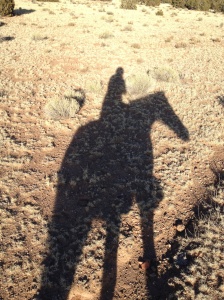
1. The horse really likes the owner and could “love” them.
This horse and owner team have a running start and may have already been doing some rituals without knowing it. There is energetic harmony between them. The work can move along very swiftly with this pair.
2. The horse really likes the owner but doesn’t do anything he is asked, or does what he’s asked when he feels like it.
With this horse, the owner will need to go along with the program to some degree and gradually becoming a leader, and will then have more say. The issue with this relationship is that often the owner is not in his or her own power so allows the horse to take over too much. I wrote a blog on Women Who Love their Horses Too Much that explains a lot of what happens in this situation. We do a lot of energy work around this one.
3. The horse will do what the owner asks but doesn’t enjoy it, or doesn’t fully engage.
Sometimes I will find that a horse isn’t really enjoying the activity, she wants to go over to the gate and out in to the pasture. At this point I may stop the bus and just work on taking off the expectation. As humans, we have expectations and agendas and I may find I’m expecting something of my horse without noticing her needs. It’s a good idea for owners to check in with themselves to see what’s so important with this activity, or have I done enough at liberty before making this request? Or maybe it’s a liberty request and the horse just doesn’t want to do it that day. The good thing about liberty work is that it isn’t goal-oriented, at least in the short term. So if the horse would prefer another activity you can present it.
4. The horse is very connected to the owner but has opinions about what he wants to do, or feels he can’t accomplish what is asked, perhaps has performance anxiety.
This horse is similar to the horse in #2 except there is a difference that we need to tease out. What has been his past experience with work? His resume? Is he suffering from burn-out or not being listened to in his past? What this horse will need most of all is to be “met,” acknowledged for who he is, separate from his work ethic. The rituals can be a godsend for this horse who needs desperately to have no-fault insurance and be praised for doing simple things that come naturally to him. From here you can build a foundation of trust, and ultimately build joy back into the work experience, always keeping an eye on the fun “play” aspect of work.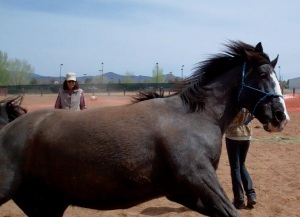
5. The horse doesn’t like the owner or doesn’t like the way he is being treated.
Sometimes people say to me they think their horse doesn’t like them, and it may be the case. But it can be changed. The relationship needs to get back onto a more level footing. The horse needs to be acknowledged for who he or she is, and treatment needs to be respectful. Sometimes people don’t recognize that scolding, popping with the end of the lead rope repeatedly, yanking on the lead rope, jerking the reins, are not conducive to having a good working relationship. It may be the way they have been taught. In some cases, none of that is happening; but owners may report that they would just like a closer relationship with their horse. Just like with the other horse/owner situations, we start with the rituals, and build a foundation of trust from there. As with any relationship, you will have to provide a reason for the horse to want to hang out with you. In these cases, we work with energetic connections as well to reinforce the strengths in the person.
6. The horse is dangerous and has created fear in the owner and others who handle him, very possibly as a result of past human handling.
This horse is a special case and would need to be worked with at a safe distance. Depending upon the horse, the trainer may need to work with the horse by sitting outside the corral rather than getting in the corral. The horse may be so distrustful as to not be reliable enough to handle for a long time.
7. The horse is joyful about the relationship and although he may space out once in awhile, he will come back to his owner in spirit and enjoy the activities presented.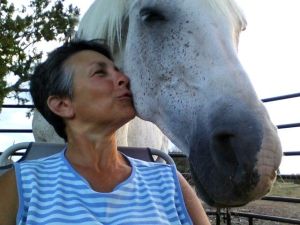
This is of course, the ideal. A horse that wants to do what we want to do, what we’re striving for with liberty work. Even though I didn’t know liberty training with my gelding Khami, now 24, he always loved endurance riding. He loved the trail and still does, so that was something we enjoyed together. Finding what the horse enjoys the most is very valuable to how you develop your relationship.
Bodywork (Ortho-Bionomy, Equine Positional Release/Equine Ortho-Bionomy): private sessions, tutorials, phone consultations, distance healing and gift certificates
Liberty Training: clinics, workshops, private sessions, tutorials, consultations: by appointment: 505.501.2478 or emailing susansmith@orthohorse.info
The upcoming Horses at Liberty Weekend Clinic will be held August 3-4 in Estancia, New Mexico. Cost is $300 Early Bird Discount if you sign up before July 10. After that date the cost will be $350. Learn from a Suggested Trainer of the Carolyn Resnick Method. Contact me if interested! susansmith@orthohorse.info
Liberty Foundations Waterhole Rituals Equine Clinic at Spirit Horse Ranch near Oklahoma City, co-teaching: Ruella Yates and Susan Smith. Liberty Horse Training. September 28-29, 2013. Contact Ruella Yates at ruella@libertyfoundations.com, or 405-771-4274.



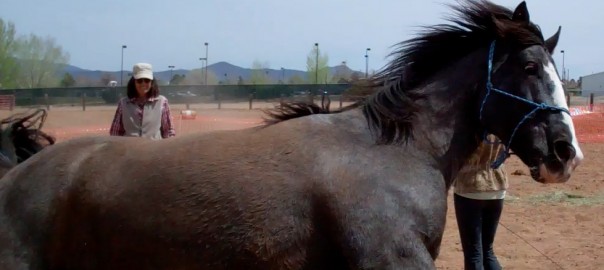
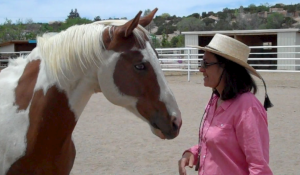
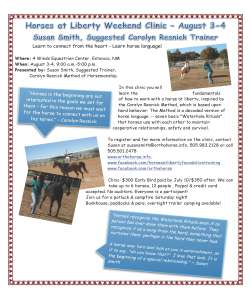
One of your best posts ever, Susan! I very much like the ‘kinds of bonds’ listed. I’m classifying my own horses now, and find cross-overs, of course!
Ruella Yates
Carolyn Resnick Certified Trainer
near Oklahoma City
It’s not only the horses, it’s the people! There are many more “kinds” of bonds, I’m sure, this is just a sampling 🙂
I’d also like to invite your readers to our Waterhole Rituals Clinic at my ranch September 28-29! Susan and I are co-clinicians guiding you to a whole new relationship with horses!
Ruella Yates
ruella@libertyfoundations.com
Are there any Liberty clinics in Florida? Would love to attend.
I don’t know of any, but you’re welcome to fly out here and take a clinic. Our next one is August 3-4 – a weekend clinic at the foot of the Manzano Mountains in ranching country. I also travel and would be happy to do a clinic in Florida if you can coordinate a group.
Could not come to you with my many horses here, but I can see if there is interest in this area. Thank you. Fort Myers, FL
A winter clinic would be great in Florida, as we can’t do clinics out here Jan-Feb., and your weather is pretty temperate then!
yes winter ideal here. If you would like to e mail me details of days, costs, etc. I will notify horse community here. Thank you.
Great! Give me a couple of days to get this together.